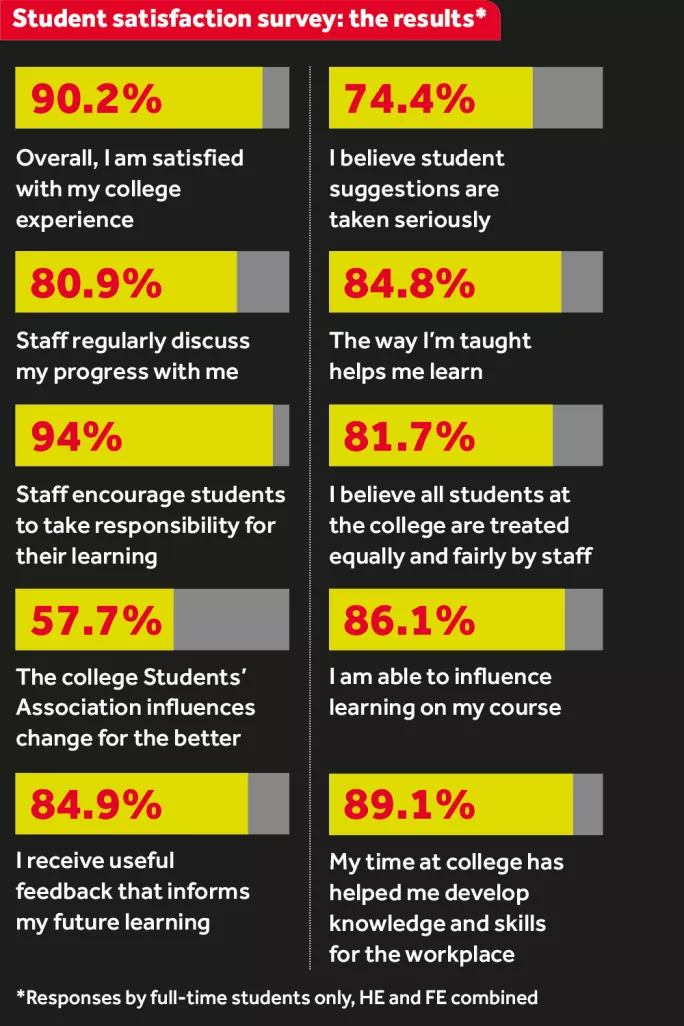
Colleges get thumbs up in student satisfaction test

Full-time college students on further education courses are more satisfied with their courses than those studying higher education courses, according to a Scottish Funding Council student satisfaction survey. The NUS Scotland students’ union has warned colleges not to become complacent and to make sure that they continue to ensure that every student has the best learning experience.
The second College Student Satisfaction and Engagement Survey also revealed that part-time students on FE-level courses were more satisfied than those on HE courses.
Scotland’s colleges provide a significant proportion of the country’s higher education provision and are seen as one of the most successful ways to widen access to HE for those from disadvantaged backgrounds.
Articulation enables students to move straight into the second or third year of a university degree after completing an HND or NHC at a Scottish college - a route into university that is often used by those from disadvantaged backgrounds.

However, the survey found that the proportion of full-time FE students who said they were satisfied with their overall college experience was 92.1 per cent, compared to 87.4 per cent among full-time HE college students.
But the satisfaction levels dropped when students were asked whether they felt they were taken seriously by their institution: the figure for full-time students was 74.4 per cent, compared to 85.8 per cent for part-time learners and 83.9 per cent for those on distance learning or flexible programmes.
Fewer students than last year said they felt the college students’ associations influenced change for the better. In July, a survey by Tes Scotland revealed a number of associations did not have any full-time staff beyond the elected sabbatical officers. Of the 13 colleges that responded, four said that their student association did not have any full-time staff.
Nine out of 10 students in the SFC survey were satisfied that their “time at college had helped them develop knowledge and skills for the workplace”.
The proportion of distance and flexible students with overall satisfaction with their college experience was 92.7 per cent - an increase of 4.6 percentage points from the previous year.
‘Fantastic routes’
There was also a 1.5 percentage points increase in the number of part-time students saying that they were satisfied with their college experience.
NUS Scotland president Luke Humberstone said it was encouraging to see more students enjoying the diverse and flexible learning styles colleges offer. “These courses can offer fantastic routes into, or back into, education - particularly for parents, carers, or anyone those who might be unable to give up work to access education,” he added.
“However, we should not be complacent. The gulf that exists between further and higher education students should be a cause for concern, especially given the key role that colleges have in widening access to higher education.”
A spokesman for the Scottish Funding Council said that the survey helped build a national picture of what students think about their experiences at college.
“The survey shows where there are differences in students satisfaction - either between colleges or between types of study - and so helps to encourage improvement across the sector. The good news is that, with nine out of 10 students saying that overall they are satisfied with their college learning, the baseline is already high.”
The results were also welcomed by Colleges Scotland chief executive Shona Struthers.
“This is a great achievement for the sector and demonstrates that colleges are providing the learning, skills and qualifications that students want and need to get a job, retrain and upskill and contribute to society,” she said.
“We recognise satisfaction rates for further education students were slightly higher than for higher education students. It is good to see that students studying further education are making the use of the valuable opportunities that colleges provide within local communities, giving them the confidence to gain new skills, qualifications and get a job, which might otherwise be unavailable to them.”
You need a Tes subscription to read this article
Subscribe now to read this article and get other subscriber-only content:
- Unlimited access to all Tes magazine content
- Exclusive subscriber-only stories
- Award-winning email newsletters
- Unlimited access to all Tes magazine content
- Exclusive subscriber-only stories
- Award-winning email newsletters
You need a subscription to read this article
Subscribe now to read this article and get other subscriber-only content, including:
- Unlimited access to all Tes magazine content
- Exclusive subscriber-only stories
- Award-winning email newsletters
- Unlimited access to all Tes magazine content
- Exclusive subscriber-only stories
- Award-winning email newsletters